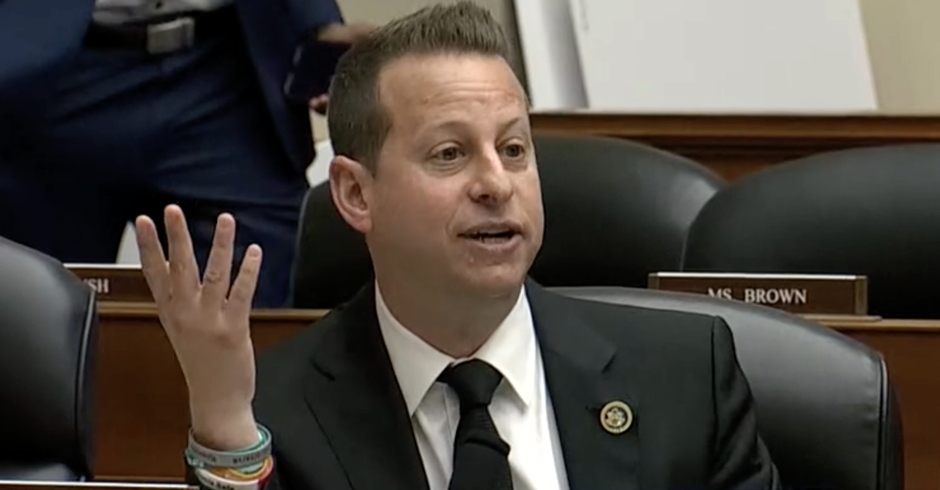Can Proper ID Save The Lives Of Transgender People In Emergencies?
Last summer when Bhumika Shrestha travelled to New York City to represent Nepal at the United Nations, she encountered some special questions during her layover in Doha. Shrestha, who is transgender — or, in Nepal, third-gender — presents as an elegant young woman. Her passport and citizenship ID card, however, both list her as a man named Kailash.
In Qatar, airline officials pulled her aside and questioned her about her passport and her appearance but eventually let her go.
The experience was unpleasant for Shrestha but not unsafe. In the worst-case scenario, the documentation discrepancy would have sent her home on the next flight to Kathmandu.
“They asked me questions, and I was scared to fail on my first trip to the U.S.,” she recalls, “but then they believed my story that I was transgender and let me get on the plane.”
Like so many transgender people, Shrestha faces daily administrative struggles. As Paisley Currah, professor of Political Science at City University of New York, explains in a paper titled “Securitizing Gender: Identity, Biometrics, and Transgender Bodies at the Airport,” “When an individual’s cultural legibility is not affirmed by their identity papers, even everyday quotidian transactions become moments of vulnerability.”
However, while common transactions might be difficult, in situations where security is heightened — such as at the airport — discrepancies between gender presentation and documentation can make transgender people the targets of increased scrutiny, neglect, or abuse.
Such vulnerability can be aggravated by emergency conditions. Similar to situations at the airport, during emergencies that require intensified security, people who don’t conform to gendered expectations become anomalies, and anomalies get special — and sometimes unjust — attention. Several countries have seen this happen. International relief agencies admit there is a dearth of attention paid to this issue.
Nepal, with its protected legal status for third-gender citizens, and currently in a disaster preparedness phase awaiting an earthquake, provides a compelling case study for how gender-appropriate ID can protect citizens in emergency situations. The stories from other disasters support government issuance of third-gender ID documents, a move the central government in Nepal has yet to make.
The Importance of Being Eunuch
In the aftermath of the devastating 2004 Indian Ocean tsunami — which killed nearly a quarter of a million people in 14 countries — aid and relief organizations in India paid special attention to how their services were administered across genders. Recognizing that women were particularly vulnerable in post-disaster situations, efforts were made to develop gender-sensitive programs.
However, in spite of these special considerations for gender, a class of citizens who do not conform to a binary gender system — male or female — was often excluded from the relief efforts.
The Aravanis of India fall into a third-gender category. The term “Aravani” is used in the state of Tamil Nadu, where the tsunami struck most violently, to refer to a group more widely known as “hijras,” biological males who have feminine gender identity, frequently wear women’s clothing, and perform other feminine gender roles.
When the tsunami hit in late 2004, the resultant disaster aggravated the already deeply entrenched marginalization of third-gender people. In a 2008 report reflecting on the relief efforts, “Indian Ocean Tsunami Through the Gender Lens,” Oxfam research suggests that third-gender “vulnerabilities worsened in the aftermath of the Tsunami.”
The report explains that the “systemic exclusion faced by the Aravanis before the Tsunami was reinforced in post-disaster management practices” and cites homelessness, career-ending injuries (many Aravanis are dancers), and the lack of ration cards (denied because of their gender identity) as impediments to their ability to access basic services and live with dignity.
“Social hierarchies reproduce themselves in contexts of disaster,” explains Arvind Narrain, a leading human rights lawyer in India. “Those who are the margins of society find themselves ostracized and discriminated against when it comes to receiving aid.” Transgenders fall within this category.
“The exclusion of Aravanis in government policy and gender discourse has largely rendered them invisible,” confirms the Oxfam report. “This invisibility was compounded in the aftermath of the Tsunami.”
Just months after the tsunami, India’s third-gender citizens could start registering for passports as a third gender, eunuch, denoted by an “E.” In 2009, further progress was made, adding an “E” to voter registration documents. And in 2011, the Indian government’s heralded citizen ID number system allows “transgender” as a gender option.
But, explains Narrain, ID is not enough. “What one is combating is social prejudice,” he says. “In the immediate crisis situation, what one needs is sensitivity of the relief workers.” However in moving toward the stage of rehabilitation, Narrain believes “documents become key as one cannot avail of aid schemes without it.”
Denied Entry, Fitting the Program
In the ongoing 2011 flood relief efforts in Pakistan, reports have emerged that transgenders are getting left out of the aid efforts and denied from IDP camps because of general prejudice, their non-conforming appearance, and their lack of proper identification documents.
Bindiya Rana, of Gender Interactive Alliance, an NGO working with transgenders in Pakistan, explains that while the Pakistani supreme court directed the government to issue third-gender ID cards in 2009, none have been given out yet. As a result, many transgender citizens lack any identification documents at all. According to Rana, this occurs because “a lot of transgenders get separated from their parents from a very young age and are unable to get their parents’ ID cards and other supporting documents which are required to get an ID.”
Similar instances of aid denial occurred in post-earthquake Haiti.
While same-sex sexual activity between consenting adults has been legal in Haiti since 1986, the LGBT community has been marginalized by years of oppression from government, religious, and community leaders. Daily movement can be dangerous, especially for those who present in a way that is perceived to be gay or transgender.
To cope with harassment and discrimination, LGBT people, writes IGLHRC (the International Gay and Lesbian Human Rights Commission) in a 2011 report, “rely on the vigilance of family, friends, and sympathetic neighbors [and] … derive a sense of security from the ability to close a window or lock a door as both physical and a psychological barriers against intrusion and violence.”
But the earthquake destroyed the infrastructure — from walls that kept lives private to alleyways that made travel to clinics and gathering spaces safe — that made security for the lives of LGBT people possible. In the wake of the damage, people who had relied on specialized and often secret services, such as HIV/AIDS medical clinics, were forced to turn to the common consumption of relief aid.
In light of the vulnerability of women in many emergency situations, relief distribution programs often operate by focusing on getting supplies into the hands of women. Studies have demonstrated that women are more likely to distribute relief materials to vulnerable people within families, such as children and the elderly, than are men.
In Haiti IGLHRC research found this problematic for transgender people and people who do not live in a home with a female who qualifies as head of household. Writes IGLHRC: “[T]his policy has had the unintended side-effect of excluding many gay men and transgender people in need.” Their research profiled a gay man who was so desperate to receive food rations that he attempted to stand in a women-only line at an IDP camp dressed as a woman. He was discovered by others in the line and beaten until he ran away.
The More You Know
As Nepal braces for an earthquake, the tension is palpable. Embassies, the government, and INGOs are offering preparedness seminars and consultations. Fliers advertising ready-made safety kits and “go-bags” appear across Kathmandu. A quake hit eastern Nepal in late September and caused some damage and a few deaths, even some in the capital. “Kathmandu is the next Port-au-Prince, but worse,” goes a common refrain in preparedness seminar conversations.
Since 2007, the government of Nepal has been legally mandated by the supreme court to issue third-gender citizenship ID cards; however, only three citizens have successfully registered, despite hundreds attempting. In a gesture of progress, the 2011 national census — despite faulty methodology and accusations of fraud — allowed people to register as third-gender. Similarly, ongoing voter registration in the country has been third-gender-inclusive.
Sunil Babu Pant, MP, director of Blue Diamond Society, Nepal’s LGBTI rights organization, understands the gravity of the situation for third-genders as the country prepares for an earthquake. “All of the small ways in which they face discrimination now will intensify after a disaster when people are desperate for help,” explains Pant, who sits on a parliamentary committee charged with implementing disaster preparedness projects.
Pitamber Aryal, Director of the Disaster Management Department at Red Cross Nepal, which includes disaster response, preparedness and risk reduction, and recovery, frames the problem as one of information: “In crisis response, our default unit is the household, the family,” he explains. “During an emergency, we can’t go check in each household to make sure the aid is being distributed fairly and the family members treated equally.”
In Nepal and other countries where people often live with their families into adulthood, transgender people of all ages may experience stigma and discrimination within the household, and that could manifest itself harshly in resource distribution. In such situations, transgender identification documents might not be immediately helpful. However having government documentation of this class of citizens would encourage relief efforts to be more sensitive to their needs.
“Proper ID cards would give a clear mandate to relief services,” explains Aryal, “to pay attention to transgender people as a vulnerable class of people, and thus make the programs appropriate for their needs.”
Pant agrees: “Citizenship ID cards allow Nepali citizens access to the most basic services. After an earthquake, those basic services will be food, water, and shelter — the things that will make the difference between life and death.”
But ID doesn’t complete the work.
“We need to have gender sensitization activities targeting to different levels … so that people don’t experience stigma, whether it is from the decision maker, service provider, or community,” suggests Aryal. The task, he believes, is to address not only discrimination but stigma. “Unless and until we address stigma, we won’t have sustainable change.”
Pant supports the documentation of gender identity as a move in this direction. In his view, appropriate documents start to put third-gender people on a level plane with the rest of the society. “That’s a step toward eroding stigma,” he says, “then we can have conversations armed with those documents that communicate clearly what our government believes — third-genders are equal.”
The Basic Truth
Earlier this year, the UN acknowledged the importance of proper identification documents for transgender people. Navi Pillay, UN High Commissioner for Human Rights, explained, “Without official recognition of their preferred gender, transgender and intersex individuals face a wide range of practical, everyday challenges — for example, when applying for a job, opening a bank account or travelling.”
In emergency situations, the administrative hassles that can prevent adequate and appropriate care can be harsh. However, properly gendered documentation can make accessing aid a reality for more people.
“Governments have an obligation to ensure their citizens the maximum protections in emergency situations,” says Dr. Anna Neistat, associate director of the emergencies program at Human Rights Watch. Neistat, who has researched emergencies in more than a dozen countries — including Nepal, Haiti, and Pakistan — puts the simplicity of gender-appropriate identification documents in context: “In conflict and disaster situations, access to humanitarian aid is a human right for all people regardless of identity or presentation, and governments must ensure that aid is accessible.”
Ensuring the safety of transgender people is not as simple as allowing them to document their identity. And carrying around documents that mark people as such — or even counting LGBT people — can bring up myriad safety concerns. What is more, the definitions of gender can differ from document to document, and region to region. Currah reminds us that “for transgender people, the immense number of state actors defining sex [and gender] ensnares them in a Kafkaesque web of official identity contradiction and chaos.”
However, the potential for effective exclusion of transgender people from basic relief in emergency situations sheds light on the urgency with which identity documentation must be carefully considered for all people, and in all programs.
Â
Kyle Knight is a Fulbright Scholar in Nepal where his research focuses on the LGBTI rights movement. He previously worked at Human Rights Watch, where he focused on children’s rights issue. For three years, he worked as a suicide prevention counselor for LGBTQ youth at the Trevor Project in New York City. He currently sits on the Trevor Project’s Advocacy and Public Policy Committee, is the president of the Duke University LGBT Network, and a is lecturer in Gender Studies at Tribhuvan University, Nepal’s state-run university in Kathmandu. You can follow him on Twitter @knightktm.

Enjoy this piece?
… then let us make a small request. The New Civil Rights Movement depends on readers like you to meet our ongoing expenses and continue producing quality progressive journalism. Three Silicon Valley giants consume 70 percent of all online advertising dollars, so we need your help to continue doing what we do.
NCRM is independent. You won’t find mainstream media bias here. From unflinching coverage of religious extremism, to spotlighting efforts to roll back our rights, NCRM continues to speak truth to power. America needs independent voices like NCRM to be sure no one is forgotten.
Every reader contribution, whatever the amount, makes a tremendous difference. Help ensure NCRM remains independent long into the future. Support progressive journalism with a one-time contribution to NCRM, or click here to become a subscriber. Thank you. Click here to donate by check.
 |












